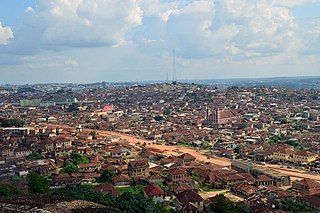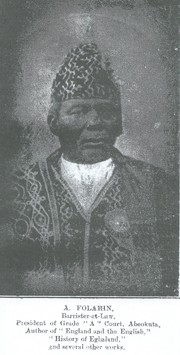
Ogun State is a state in southwestern Nigeria. Created on 3 February 1976 from the former Western State. Ogun State borders the Republic of Benin to the west for about 185 km, Oyo State and Osun State to the north, Ondo State to the east, Lagos State to the south, and has 16 km of coastline on the Bight of Benin to the south, interrupted by Araromi Beach exclave of Ondo State.
Omoba Sir Adetokunbo Adegboyega AdemolaSAN was a Nigerian jurist who was the Chief Justice of Nigeria from 1958 to 1972. He was appointed as Chief Justice on 1 April 1958, replacing Sir Stafford Foster Sutton who was retiring. Ademola was a son of Oba Sir Ladapo Ademola II, the Alake of the Egba clan of Nigeria. He was the first chancellor of the University of Benin.
The Egba people are a subgroup of the Yoruba people, an ethnic group of western Nigeria, a majority of whom are from the central part of Ogun State that is Ogun Central Senatorial District.
Chief Suarau Olayiwola Alani Bankole is a Nigerian Egba businessman and chieftain from Ogun State. He was the Chairman of West African Aluminum Products Plc. He holds the Yoruba chieftaincy titles of the Oluwo of Iporo Ake and the Apena of Egbaland.

Abeokuta is the capital city of Ogun State in southwest Nigeria. It is situated on the east bank of the Ogun River, near a group of rocky outcrops in a wooded savanna; 77 kilometres (48 mi) north of Lagos by railway, or 130 kilometres (81 mi) by water. As of 2006, Abeokuta and the surrounding area had a population of 449,088.
Ifo is a Local Government Area in Ogun State, Nigeria. Its headquarters are in the town of Ifo at 6°49′00″N3°12′00″E.It has an area of 521 km2 (201 sq mi) and a population of 698,837 at the 2006 census "Adebami-Tella". The postal code of the area is 112.
Egba Ake, otherwise known as Egba Alake, is one of the four sections of Egbaland, the others being Oke-Ona, Gbagura, the Owu. In Abeokuta Town, however, there is also Ibara Kingdom. It is a traditional state which joins with its bordering sections to form something of a high kingship. The Alake of Abeokuta, or Alake of Egbaland, is the traditional ruler of the Egba clan of Yoruba in the city of Abeokuta in southwestern Nigeria.

Adedotun Aremu Gbadebo III is the current Alake of Egba, a clan in Abeokuta, Nigeria. He has ruled since 2 August 2005.
Ago-Oba is electoral ward 13 in the city of Abeokuta, Ogun State, Nigeria. It is part of the Abeokuta South Local Government Area.
Olumo Rock is a mountain in south-western Nigeria. It is located in the city of Abeokuta, Ogun State, and was normally used as a natural fortress during inter-tribal warfare in the 19th century. Its patron spirit is venerated in the Yoruba religion as an orisha. The name olumo is the combination of two words: "olu" which means god/deity, and "mo" which means moulded.

The Saro, or Nigerian Creoles of the 19th and early 20th centuries, were Africans that were emancipated and initially resettled in Freetown, Sierra Leone by the Royal Navy, which, with the West Africa Squadron, enforced the abolition of the international slave trade after the British Parliament passed the Slave Trade Act 1807. Those freedmen who migrated back to Nigeria from Sierra Leone, over several generations starting from the 1830s, became known locally as Saro(elided form of Sierra Leone, from the Yoruba sàró). Consequently, the Saro are culturally descended from Sierra Leone Creoles, with ancestral roots to the Yoruba people of Nigeria.

The Alake of Egbaland is the paramount Yoruba king of the Egba, a clan in Abeokuta, Ogun State, southwestern Nigeria. Egba consists of Egba Ake, Owu kingdom, Oke-Ona and Egba Gbagura.

Oba Sir Ladapo Samuel Ademola KBE, CMG (1872–1962), also known as Ademola II, was the Alake of Abeokuta from 1920 to 1962. Before he was crowned Alake, Ademola was involved in the affairs of the Egba United Government. As a member of the Egba council, he was a leading participant in negotiations with the Lagos State colonial government in 1889 for the rights to construct railway tracks passing through Egbaland. In 1904 he travelled with Alake Gbadebo to the U.K., where they were received by King Edward VII. He succeeded Oba Gbadebo in 1920 with overwhelming votes from the Egba council.
Iju also known as Iju Oloko [idʒou ɔ:lɔkɔ], is a Nigerian town located in southern Ogun state and about 18 kilometers from Lagos state, a major commercial hub in West Africa. The town is inhabited mostly by Owu and Egba natives whose ancestors settled there between 1842 and 1845.
Samuel Adesina Gbadebo, otherwise known as Gbadebo II, was a Nigerian traditional monarch who held the title of Alake of Egbaland. Prior to becoming Alake, Gbadebo organized agricultural shows in the Western region of Nigeria.
Wasinmi or Wasimi is an Egba town located on the Lagos-Abeokuta Expressway in Ewekoro local government of Ogun State. It is a few miles from Abeokuta. It is home to one of the oldest churches in the area, St. Michael's Anglican Church, and home to Odegbami International College and Sports Academy.
Josiah Sobowale Sowande also known as Sobo Arobiodu was a Yoruba poet from Abeokuta, Ogun State who was a pioneer writer of Ewi, a Yoruba language style of poetry.
Adegboyega Edun was an Egba official. He served as the secretary of the Egba United Government, a colonial-era Yoruba political entity.
Okukenu Sagbua was a Yoruba Egba chief. He was a founding member of the Ogboni of Egbaland, and also served as the first Alake of Egbaland.

Chief Adebesin Folarin was a Nigerian barrister, judge, public official, historian and author. He was one of the leading intellectuals in early 20th-century Abeokuta, and is recognised as "one of the first truly nationalist historians".






